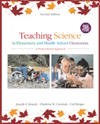| body-kinesthetic intelligence | Intelligence where learners use movement in learning.
|
 |
 |
 |
| calendar | Timetable of dates of events and lessons.
|
 |
 |
 |
| curriculum integration | A blending of subject areas such that the separate parts are not discernible.
|
 |
 |
 |
| departmentalized | Schools that are organized in a manner that teachers are separated by subject area (teach only their subject area).
|
 |
 |
 |
| integrated | The crossing of subject matter boundaries.
|
 |
 |
 |
| interdisciplinary | An approach that consciously applies methodology and language from more than one discipline to examine a central theme, issue, problem, topic, or experience of another.
|
 |
 |
 |
| interpersonal intelligence | Intelligence characterized by the ability to understand and interact with other people.
|
 |
 |
 |
| intrapersonal intelligence | Intelligence characterized by the ability to understand oneself.
|
 |
 |
 |
| linguistic intelligence | Intelligence characterized by the capacity to use language (written or oral).
|
 |
 |
 |
| logical-mathematical intelligence | Intelligence characterized by the capacity to use numbers.
|
 |
 |
 |
| multiple intelligences | Forms of intelligence categorized as mathematical-logical, linguistic, spatial, bodily kinesthetic, musical, interpersonal, intrapersonal, and naturalist.
|
 |
 |
 |
| musical intelligence | Intelligence characterized by sensitivity to sound, pitch, and rhythm.
|
 |
 |
 |
| naturalist intelligence | Intelligence characterized by a person's ability to identify and classify patterns in nature.
|
 |
 |
 |
| resources | Books, curricula, equipment, supplies, and materials.
|
 |
 |
 |
| thematic | A unifying topic or subject transcending traditional subject boundaries.
|
 |
 |
 |
| visual-spatial intelligence | Intelligence characterized by a person's ability to think in terms of physical space.
|



 2003 McGraw-Hill Higher Education
2003 McGraw-Hill Higher Education